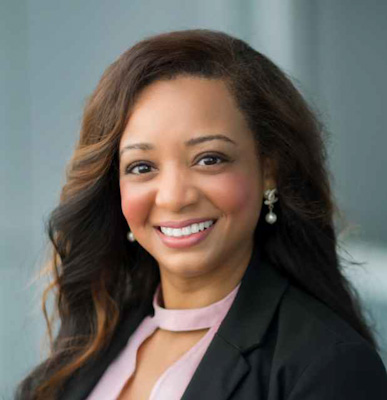2023 was a record year for Disaster Legal Services program
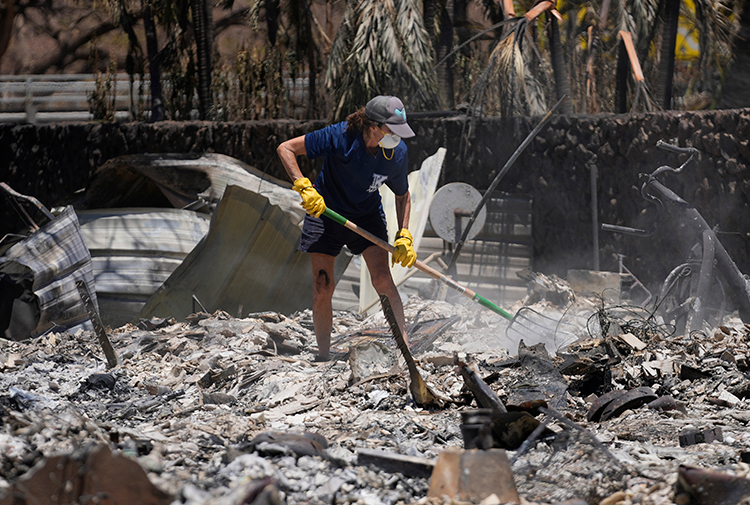
The Hawaii wildfires caused a great need for civil legal services, and the ABA Young Lawyers Division's Disaster Legal Services program responded by assisting with insurance claims, lost legal documents, home repair contracts and landlord disputes. Photo by Rick Bowmer/The Associated Press.
It’s been a busy 12 months for the ABA Young Lawyers Division’s Disaster Legal Services program. According to Amanda Brown, the director of the program, Disaster Legal Services helped survivors navigate the aftermath of a record 23 federally declared natural disasters in 2023.
This includes Hurricane Idalia, which struck Georgia and other areas of the southeast, as well as severe storms and flooding in Mississippi, Illinois and Alaska and unprecedented wildfires in Hawaii.
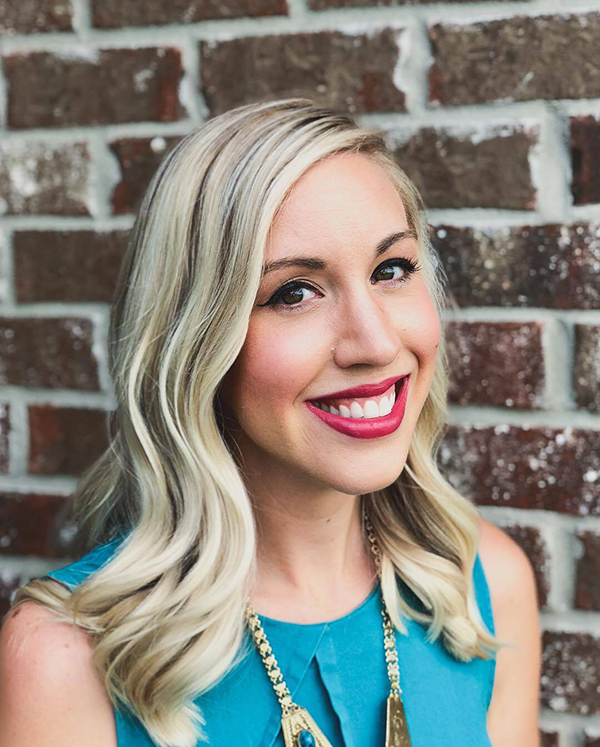 “We want the legal community to think ahead about how climate change is going to impact them not just from a business continuity or operational perspective, but how it will impact their clients, how it will impact society,” says Amanda Brown, director of the Disaster Legal Services program.
“We want the legal community to think ahead about how climate change is going to impact them not just from a business continuity or operational perspective, but how it will impact their clients, how it will impact society,” says Amanda Brown, director of the Disaster Legal Services program.“This was a huge year for disaster implementations, with respect to the volume of disasters that the program has been activated for,” Brown says. “Several of these, like Typhoon Mawar and the Maui fires, were quite extensive.”
Disaster Legal Services helps state bar associations and pro bono lawyers set up hotlines and coordinate the delivery of free legal services to survivors in the wake of major disasters. This includes assisting with insurance claims, recovery of lost legal documents, home repair contracts and disputes with landlords.
The program, which has been in existence since the early 1970s, operates in conjunction with the Federal Emergency Management Agency and local legal aid offices.
“I like to think of it as getting everyone around the table to talk about what the legal issues are and work directly with FEMA on filling any gaps and addressing any communication issues,” says Jeanne Ortiz-Ortiz, a vice director of Disaster Legal Services.
The program also organizes trainings for volunteer lawyers who are new to disaster response or working with FEMA, which provides financial assistance and direct services to people and families affected by a disaster. Volunteer lawyers also help survivors with appeals after FEMA deems them to be ineligible for assistance.
Since November 2020, Disaster Legal Services’ partners have fielded as many as 5,000 calls from survivors, according to the program’s data. It also shows that about 3,000 of those calls came in during this year alone.
Focus on the future
In addition to individualized disaster responses, the Disaster Legal Services team worked on ways to do more extensive and systemic work in 2023.
In one initiative, the team is collaborating with FEMA to collect and share comprehensive data involving disaster survivors who apply for federal assistance. Brown says this could provide a better understanding of which people and families are most likely to need their support in the future. It could also help volunteer attorneys on the other end of their work with navigating FEMA appeals.
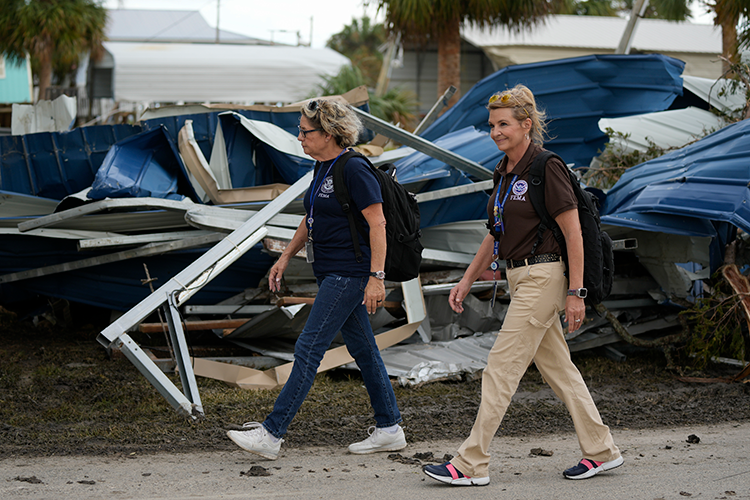 FEMA representatives walk through debris from Hurricane Idalia in Horseshoe Beach, Florida. Photo by Rebecca Blackwell/The Associated Press.
FEMA representatives walk through debris from Hurricane Idalia in Horseshoe Beach, Florida. Photo by Rebecca Blackwell/The Associated Press.
“It would help to get better clarity on why people are being found ineligible at what rates, so our program partners can do better outreach and advocacy around those specific issues,” says Brown, the founder and executive director of Lagniappe Law Lab in New Orleans. “It will also enable us to see larger trends in possible inequities in disasters, which might give us a better opportunity to do higher-level advocacy within FEMA for issues we think need to be addressed.”
The Disaster Legal Services program has also assisted with several initiatives aiming to support a broader spectrum of survivors, including those who speak Spanish and may not have easy access to legal assistance.
Disaster Legal Services and Pro Bono Net worked together last year to create a Spanish-language version of a self-help disaster recovery tool that allows survivors to create and file a FEMA appeal letter. Ortiz-Ortiz, who previously was a senior program manager at Pro Bono Net, says the nonprofit organization hosted a bilingual training session in September to educate attorneys and advocates on FEMA appeals, as well as how to use the new tool.
She adds that Disaster Legal Services’ role in increasing accessibility for Spanish-speaking survivors comes as FEMA has also committed to examining its policies and procedures and eliminating barriers that prevent marginalized and other vulnerable populations from accessing federal disaster assistance.
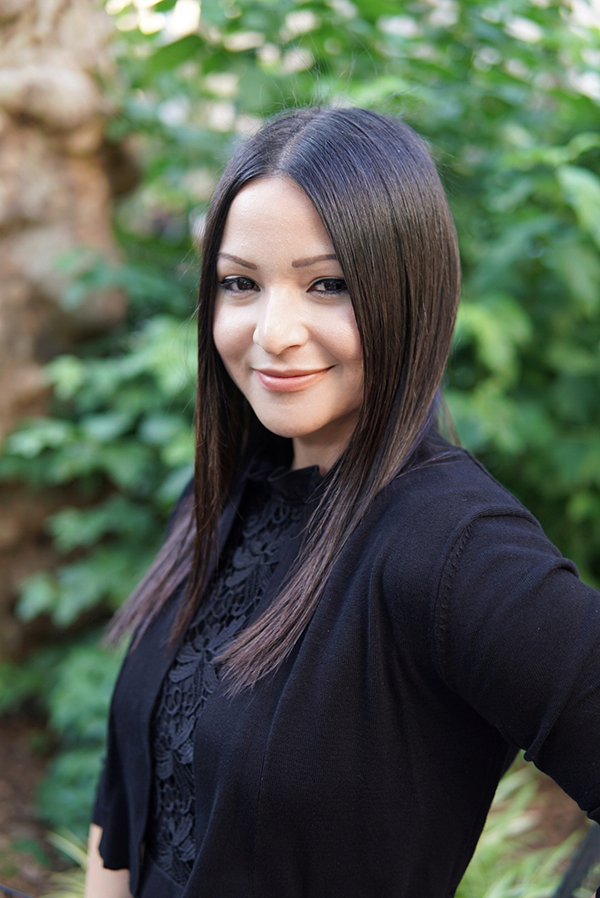 ““I like to think of it as getting everyone around the table to talk about what the legal issues are,” says Jeanne Ortiz-Ortiz, a vice director of Disaster Legal Services.
““I like to think of it as getting everyone around the table to talk about what the legal issues are,” says Jeanne Ortiz-Ortiz, a vice director of Disaster Legal Services.“The tool is useful for people who are navigating the federal disaster process by themselves, but it has also proven helpful for people like disaster case managers, community organizers and volunteers that are working directly with survivors on a recovery plan,” says Ortiz-Ortiz, who is now the director of the Public Interest Center at St. John’s University School of Law in New York City. “We are trying to target those advocates and let them know this is a tool that’s available, and it’s also now available in Spanish.”
While the Disaster Legal Services program has historically helped lawyers respond to natural disasters that impact their communities, Brown points out that she and her team are hoping to shift the narrative in the coming years. They want to also advise their colleagues on how to better prepare for legal issues that arise during these times.
Disaster Legal Services helped organize the 2023 Disaster Resilience Symposium, which brought legal, academic and community leaders to the Stetson University College of Law to discuss disaster preparedness and response in March. That same month, the program also hosted “What Happens Now? The Attorney’s Guide to Climate Change Related Disasters,” a webinar that explores legal issues associated with climate change and lawyers’ potential ethical obligations when representing clients impacted by climate-driven disasters.
Brown, who moderated the webinar, also participated in “Climate Disaster Recovery and Community Resilience: The Role of Legal Professionals” in November. As part of this Practising Law Institute program, she highlighted effective models for delivering legal aid after major disasters, as well as how law students and law schools could play a larger role in disaster response in the future.
“We want the legal community to think ahead about how climate change is going to impact them not just from a business continuity or operational perspective but how it will impact their clients, how it will impact society,” Brown says. “We’re at a time now where the conversation around climate change is actually [gaining traction]. People are starting to pay more attention.”
For more information on volunteering with the ABA Young Lawyers Division’s Disaster Legal Services program or to donate to the program, visit the website.

